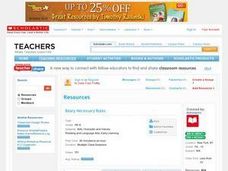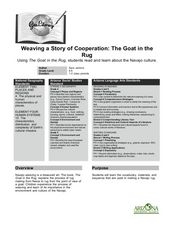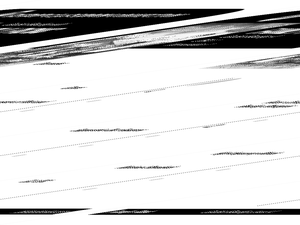Curated OER
Using Details from the Text
Explore non-fiction comprehension strategies with your class. They will visualize daily activities and label a 4 circle Venn diagram with related phrases. They must identify the overlapping sections as "main ideas," then complete a...
Curated OER
Guided Reading: What Is Government?
Learn about the government's role in everyday life in a guided reading activity. Groups create a KWL chart concerning the government's impact on the community.
Houghton Mifflin Harcourt
Strategy 3: Using Graphic Organizers Implementation Guide
Whether or not you are new to using graphic organizers with informational or expository text, the materials in this guide will prove useful.
Novelinks
Man's Search for Meaning: ReQuest Procedure Questioning Strategy
As part of a study of Viktor Frankl's Man's Search for Meaning, class members respond to, and craft, higher-level comprehension questions based on passages from the text.
EngageNY
Main Ideas in Informational Text: Analyzing a Firsthand Human Rights Account
Although this is part of a series, lesson plan nine has your class take a break from their close study of the Universal Declaration of Human Rights (UDHR) text to read the firsthand account “Teaching Nepalis to Read, Plant, and Vote” by...
Curated OER
Beary Necessary Rules
Young pupils learn about classroom rules as they also practice active reading strategies and reading comprehension skills. This lesson plan begins with a thorough reading of the story Brown Bear, Brown Bear, What Do You See?. As the...
National Endowment for the Humanities
The Strategy of Containment, 1947–1948
How do people stop the spread of an ideology they don't think is right? Scholars research the policy of containment during the start of the Cold War. Small groups analyze primary sources to determine how the United States combated...
Thoughtful Education Press
Compare and Contrast
Encourage readers to compare and contrast the information that they find in informational text with a variety of reading passages and worksheets. Learners read all about subjects in science, social studies, and literature before...
The New York Times
Making Do: Learning and Growing Through Adversity
What is it that makes people keep going when they face challenges in life? Ask your class to consider this question in relation to their own experiences and as they read material from The New York Times. Using personal experiences and...
Learning for Justice
Mary McLeod Bethune
Young historians conduct a close reading of the text of an interview with Mary McLeod Bethune, the daughter of former slaves who taught herself to read, grew up to establish schools for other Black women, and went on to become an advisor...
K20 LEARN
Reconstruction Treaties Of 1866: The Reconstruction In Indian Territory
The Reconstruction Treaties of 1866 and their impact on the Five Tribes in the United States Civil War are the focus of a instructional activity that asks young historians to consider how these treaties affected tribal sovereignty. Class...
Curated OER
Western Civilizations, Chapter 27: The Cold War: Global Politics, Economic Recovery, and Cultural Change
Keep your scholars organized using this study plan and progress report tool, one of many great learning strategies featured in this online western civilizations resource! Although designed for use alongside the Western Civilizations...
Curated OER
Chapter 28: Red Flags and Velvet Revolutions: The End of the Cold War, 1960-1990
Set your historians up for testing success using this interactive flashcard tool. It is one of many learning strategies offered in this thorough online resource. Although designed for use with a text, the site is valuable independently....
K12 Reader
An Independent Nation
If your kids are curious about the American Revolution, help them understand more about its background with a reading passage and comprehension questions. Kids use context clues to answer each question, some of which require more...
K12 Reader
Find the Meaning: JFK's Inaugural Speech
Analyze a seminal speech from the 20th century with an activity focused on President John F. Kennedy's inaugural address. After reading an excerpt from the address, pupils use a worksheet to practice their reading comprehension skills...
K12 Reader
Summarize It: President Theodore Roosevelt's 7th Annual Message to Congress
How did Theodore Roosevelt stress the importance of conservation during his time as president of the United States? Take a closer look at the language Roosevelt used himself in a 1907 address to Congress, and have your young historians...
K12 Reader
National Symbols
What are the most prominent symbols of the United States? Learn about the bald eagle, the American flag, and the Statue of Liberty in a reading comprehension activity that includes a short passage and five reflective questions.
Core Knowledge Foundation
Unit 6: The Reformation
Over three weeks, fifth graders read about and discuss the Reformation which saw religion and politics shift across Europe. Following daily readings, young scholars practice spelling, grammar, and morphology skills such as prefixes,...
Core Knowledge Foundation
Third Grade Skills Unit 4: Stories of Ancient Rome
A unit covering stories of Ancient Rome examines spelling rules, suffixes, verbs, quotation marks, writing, and dictionary skills. Lessons follow a similar routine; reading, skills practice, and extension activities, followed by...
Curated OER
Flat Stanley, a Literature Lesson Plan Transformed into a Multiculturalized and ESOL Strategy-Infused Lesson Plan
Third graders complete a variety of reading and writing activities related to the book "Flat Stanley." They create an illustration and write a short summary for each chapter, and write a letter and send a "Flat Stanley" to a friend or...
Curated OER
From George to Martha: Writing a Sonnet Using Primary Sources
What was the relationship like between George and Martha Washington? To protect their privacy, Martha Washington destroyed all her husband’s letters after his death so historians have little evidence of their lives together. Two letters...
Curated OER
Weaving a Story of Cooperation: The Goat in the Rug
Weaving is an important part of Navajo culture. Read The Goat in the Rug to your fourth and fifth graders, and give them a glimpse into the process of rug making from the point of view of a goat! They will learn new vocabulary words and...
Curated OER
Guided Reading: Family Picnic
Students blend phonemes. For this guided reading lesson, students create words by blending isolated phonemes. Students read a book discussing families.
Read Works
Famous Inventors Alexander Graham Bell: You Rang?
Scholars read a brief informational text about the famous inventor, Alexander Graham Bell and his invention of the telephone, then show what they know by way of eight questions—six multiple choice and two short answer.

























